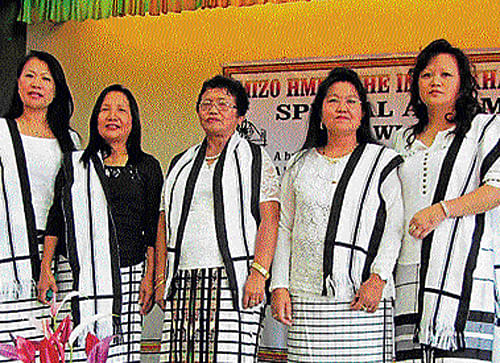The women of Mizoram are making way for better financial, marital, safety, and societal status for themselves, by way of law, writes Ninglun Hanghal.
After years of advocacy and repeated attempts at sending memorandums and draft bills to the Assembly and other executive bodies, the Mizo Hmeichhe Insuihkhawm Pawl (MHIP) finally managed to push the system into considering judicial and legislative changes in the marriage, divorce, and inheritance and succession laws in order to safeguard the interests of ordinary women.
Women’s woes
The dynamic Pi Sangkhumi, former president of MHIP, is a happy woman. It’s been her long-cherished dream to ensure reforms related to marriage and inheritance as she has seen generations of Mizo women suffer because of the legal biases in the system. Explaining the need for these reforms, she says, “A Mizo woman has never had any rights over property whether moveable, immoveable or even gifts, known as ‘bungrua’ in the local language, that are given to her at the time of marriage. Her husband can divorce her at any time and throw her out of the house without providing any financial support.”
Traditionally, Mizo women have played a productive role not just within their homes – as wives and mothers – but have also made a mark as entrepreneurs, teachers and officers in the state administration. However, just as the state’s history has been strife-torn, so has the life of its women, who have borne the worst consequences of the instability and violence that had marked the region.
Mizo horrors
An incident involving the brutal gang rape of two young women by army jawans in 1966 is a case in point. On a fateful November night, the MNF attacked a convoy of Army personnel advancing towards the Champhai village in east Mizoram. In retaliation the Army herded the villagers together and set fire to their homes. The two women, the daughters of prominent community leaders, were held separately in a small hut where soldiers allegedly took turns in raping them.
After 47 years, a compensation of Rs 5 lakh each has recently been announced by the central government for the two survivors, who are in a pitiable condition today. Reportedly, one of them just sits quietly all day with a blank expression on her face and needs assistance to even move around. The other survivor suffers from extreme paranoia and nightmares. She refuses to sleep alone and is suspicious of everyone around her. This story is common to many victims who have endured such traumas during the years of the revolt.
Women force
It was these crimes being committed against women that prompted various women’s groups from across the state and even outside to come together and form a powerful organisation that worked to fight for the collective rights of the women of the state. The MHIP was created in 1974 when Mizoram was still a Union Territory – it got full statehood in 1986 – and it literally means binding women together.
Besides implementing several initiatives for the empowerment of women, particularly related to education and entrepreneurship development in the recent decades, MHIP has been focusing on convincing people to change traditional systems and customs that suppress women, both within the family and in society.
Pi Sangkhumi is of the opinion that while “Mizo women are definitely a part of the work force now, they are still not the decision-makers and that needs to change”. Which is why MHIP is pursuing the legislative route.
Legal route
The practice of quoting a “bride price” irks Pi Sangkhumi no end. “It’s cash or kind paid to the bride’s father during marriage but, I ask, is one supposed to ‘purchase’ one’s bride? What status will such a woman have in her marital home?” remarks the veteran activist.
Pi Sangkhumi asks, “Why can’t we legally ban the Mizo bride price practice?” She further adds, “When laws such as the Hindu Marriage Act can be passed and implemented in other parts of India, why can’t we pass a Mizo Inheritance or Divorce Law?”
Another demand that she and her group are making is for a 33 per cent reservation in the political system. As a first step towards realising their dream, MHIP is advocating for an increased induction of women candidates into local political parties.
Pi Sangkhumi is on to another task these days: getting important laws related to domestic violence, rape and human rights translated into the Mizo language. She is doing this because she strongly feels “it is important that every hardworking Mizo woman understands her rights”.
